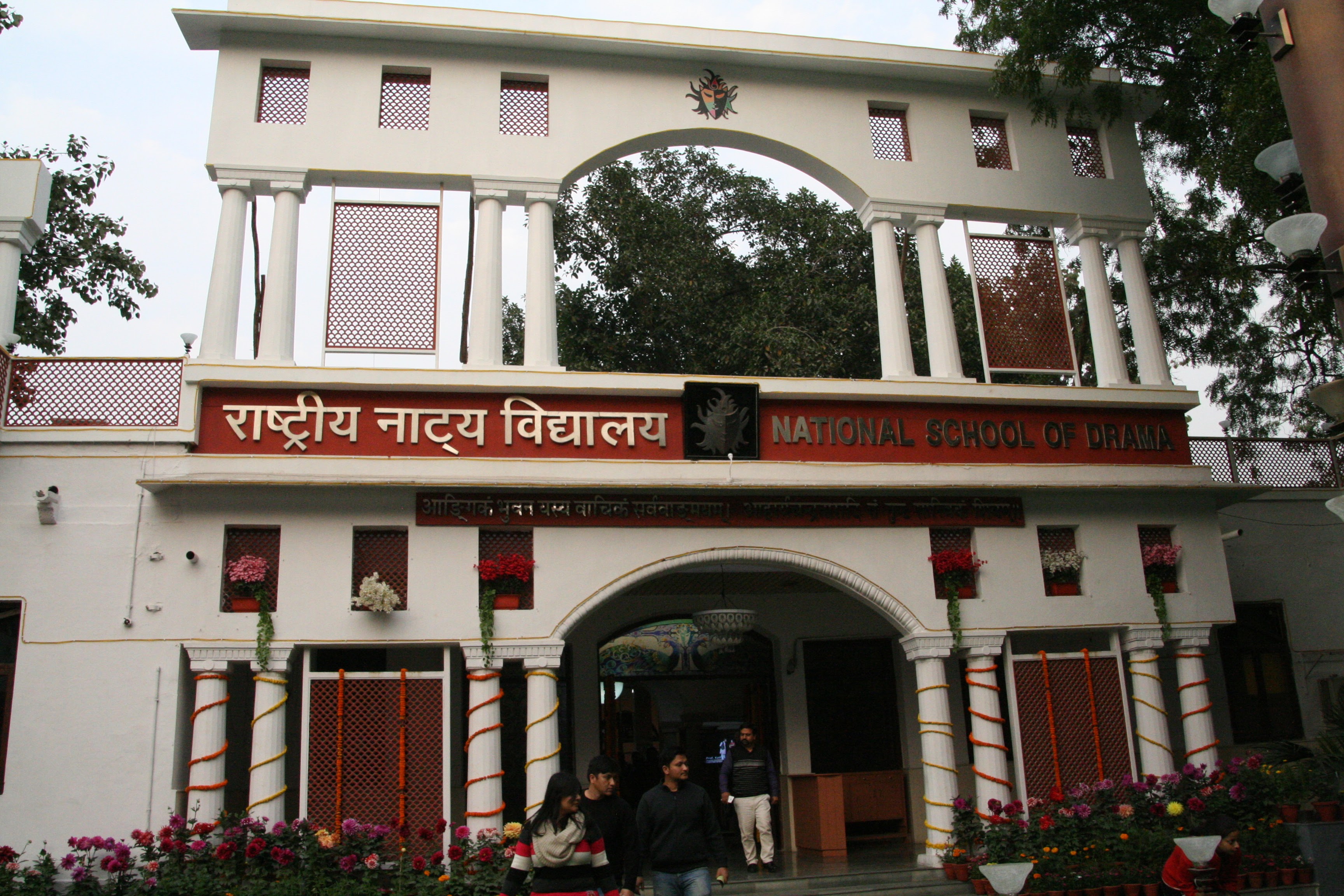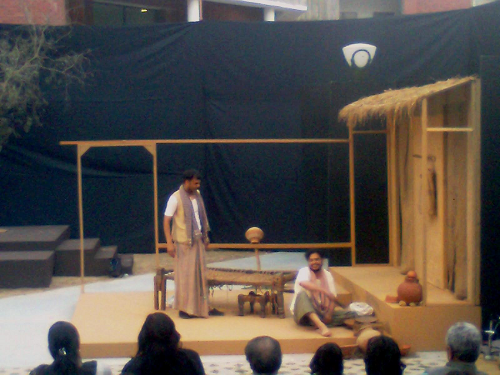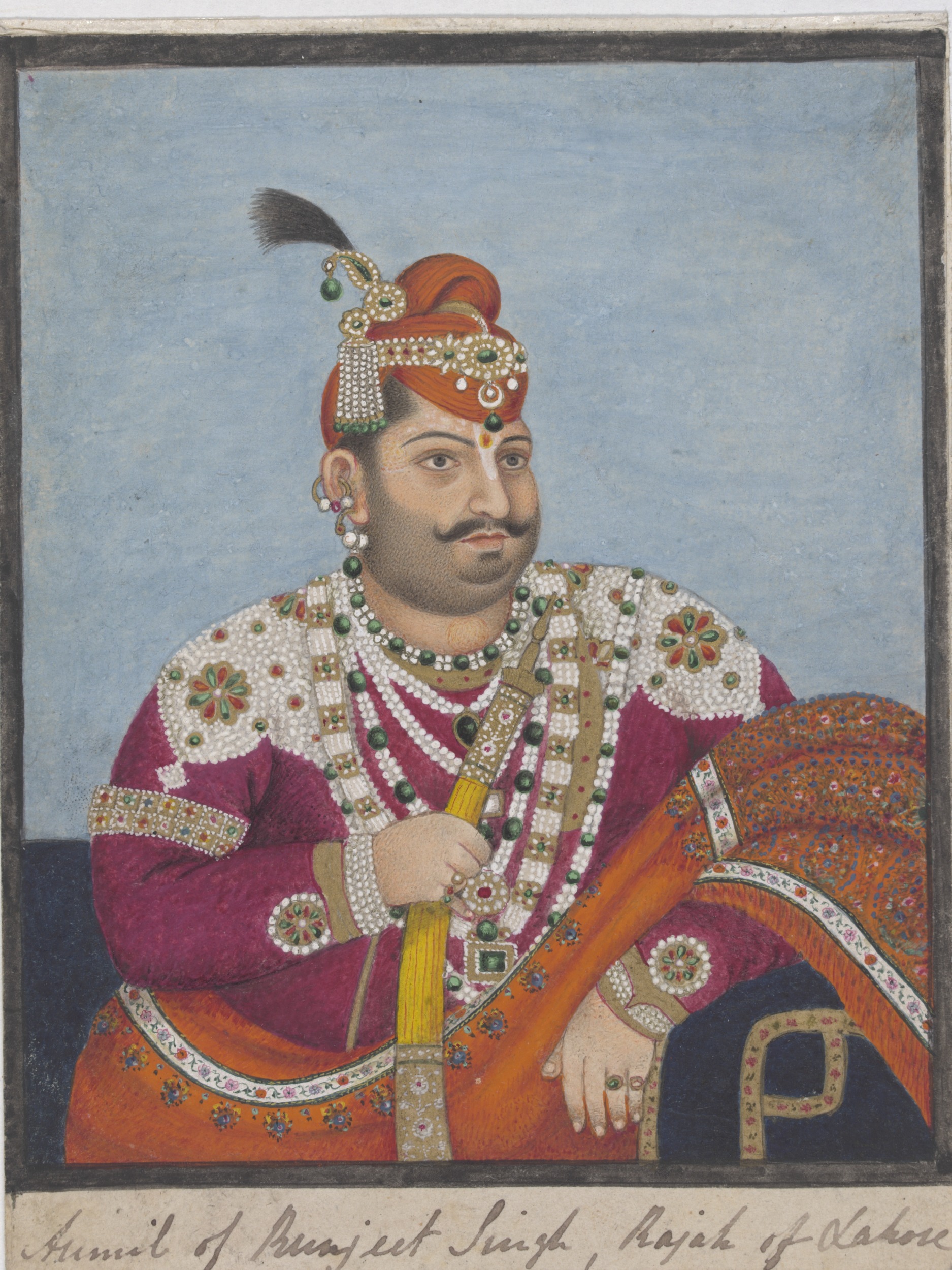|
National School Of Drama
National School of Drama (NSD) is a drama school situated at New Delhi, India. It is an autonomous organization under Ministry of Culture, Government of India. It was set up in 1959 by the Sangeet Natak Akademi and became an independent school in 1975. In 2005, it was granted deemed university status, but in 2011 it was revoked. Paresh Rawal is the current Chairperson & Chittaranjan Tripathy currently serves as Director of National School of Drama (NSD). History The origins of the school can be traced back to a seminar in 1954, where the idea of a Central institution for theatre was mooted, subsequently, a draft scheme was prepared in 1955, and the Sangeet Natak Akademi, which had Jawaharlal Nehru as its president, started drawing plans for the institution. Meanwhile, elsewhere in Delhi, Bharatiya Natya Sangh (BNS) with assistance from UNESCO, independently established the Asian Theatre Institute (ATI) on 20 January 1958, and in July 1958, ATI was taken over by the Sangeet ... [...More Info...] [...Related Items...] OR: [Wikipedia] [Google] [Baidu] |
Bharat Rang Mahotsav
Bharat Rang Mahotsav (BRM) (भारत रंग महोत्सव) or the National Theatre Festival, started in 1999, is the annual theatre festival organised by National School of Drama (NSD), New Delhi. The festival was started to showcase works of Indian theatre practitioners, and it has grown over the years to attract international performers as well. National School of Drama is India's premier theatre training institute funded by Govt. of India. Originally the festival was national in scope, but has gradually become an international one. The 2009 Festival featured 63 productions, out of which 51 were from India and 12 were overseas plays, over a span of 12 days. Today it is acknowledged as the largest theatre festival of Asia, dedicated solely to theatre 15th Bharat Rang Mahotsav The festival is generally held during the second week of January each year at venues in and around NSD campus, and also in a one "showcase city", where a "Satellite Festival" of Bharat Rang ... [...More Info...] [...Related Items...] OR: [Wikipedia] [Google] [Baidu] |
Ratan Thiyam
Ratan Thiyam (born 20 January 1948) is an Indian playwright and theatre director, and the winner of Sangeet Natak Akademi Award in 1987, one of leading figures of the "''theatre of roots''" movement in Indian theatre, which started in the 1970s. Cody, p. 1348 Also known as Thiyam Nemai, Ratan Thiyam is known for writing and staging plays that use ancient Indian theatre traditions and forms in a contemporary context. A former painter, and proficient in direction, design, script and music, Thiyam is often considered one of leading contemporary theatre gurus. He worked as chairperson of the prestigious National School of Drama from 2013 to 2017. He had also worked as vice-chairman of Sangeet Natak Akademi before joining NSD. He has also worked as Director of National School of Drama from 1987 to 1989. He is also the founder-director of ''Chorus Repertory Theatre'', formed on the outskirts of Imphal, Manipur in 1976. He was awarded the Sangeet Natak Akademi Award in Direction i ... [...More Info...] [...Related Items...] OR: [Wikipedia] [Google] [Baidu] |
National School Of Drama
National School of Drama (NSD) is a drama school situated at New Delhi, India. It is an autonomous organization under Ministry of Culture, Government of India. It was set up in 1959 by the Sangeet Natak Akademi and became an independent school in 1975. In 2005, it was granted deemed university status, but in 2011 it was revoked. Paresh Rawal is the current Chairperson & Chittaranjan Tripathy currently serves as Director of National School of Drama (NSD). History The origins of the school can be traced back to a seminar in 1954, where the idea of a Central institution for theatre was mooted, subsequently, a draft scheme was prepared in 1955, and the Sangeet Natak Akademi, which had Jawaharlal Nehru as its president, started drawing plans for the institution. Meanwhile, elsewhere in Delhi, Bharatiya Natya Sangh (BNS) with assistance from UNESCO, independently established the Asian Theatre Institute (ATI) on 20 January 1958, and in July 1958, ATI was taken over by the Sangeet ... [...More Info...] [...Related Items...] OR: [Wikipedia] [Google] [Baidu] |
Sangeet Natak Akademi
Sangeet Natak Akademi (The National Academy of Music, Dance and Drama in English language, English) is the national level academy for performing arts set up by the Government of India. It is an autonomous body of the Ministry of Culture (India), Ministry of Culture, Government of India. History It was set up by the Indian education ministry on 31 May 1952 and became functional the following year, with the appointment of its first chairman, Dr. P. V. Rajamannar. Dr Rajendra Prasad, the first President of India, inaugurated it on 28 January 1953 in a special function held in the Parliament of India#Building, Parliament House. The academy's List of Sangeet Natak Akademi fellows, Fellowship and Sangeet Natak Akademi Award, Award are considered very prestigious. Functions Sangeet Natak Akademi is an autonomous body of the Ministry of Culture (India), Ministry of Culture, Government of India. The academy functions as the apex body of the performing arts in the country to preserve ... [...More Info...] [...Related Items...] OR: [Wikipedia] [Google] [Baidu] |
Kailash Colony
Kailash Colony is a residential neighborhood in South Delhi, India. Greater Kailash is extension of this place. Neighborhoods Its neighboring areas are Kailash Hills, East of Kailash, Mount Kailash Apartments, Greater Kailash, Lajpat Nagar, Chittaranjan Park and Zamrudpur. Kailash Colony is the oldest area in all of these areas. The National Institute of Open Schooling (NIOS) had its headquarters in this area. The Apollo Spectra Hospital is a multi-specialty hospital situated in the locality. Education The following schools are in Kailash Colony: * Bluebells School International * Summer Fields School Summer Fields is a fee-paying boys' independent day and boarding preparatory school in Summertown, Oxford. It was originally called Summerfield and used to have a subsidiary school, Summerfields, St Leonards-on-Sea (known as "Summers mi"). ... * Zabaan School for Languages, an Indic language institute * Oxford Kids Preschool Delhi, Preschool * Delhi Public Schoo ... [...More Info...] [...Related Items...] OR: [Wikipedia] [Google] [Baidu] |
Neelam Mansingh Chowdhry
Dr. Neelam Man Singh Chowdhry (born 14 April 1951) is a Chandigarh-based theatre artist who has worked around the world. She was awarded the 2003 Sangeet Natak Akademi Award in the Theatre Direction category. She was the recipient of the 2011 Padma Shri Award. She is Professor Emeritus at Punjab University. Early life Neelam was born in 1950 and grew up in Amritsar, Punjab. She finished her Master's degree in art history from the Punjab University, Chandigarh. She graduated from the National School of Drama in Delhi in 1975 and trained under Ebrahim Alkazi Ebrahim Alkazi (18 October 1925 – 4 August 2020) was a Saudi Indian theatre director and drama teacher. A rigid disciplinarian, he instilled in his acting students an awe and reverence that they still carry with them, with several of them .... Works Her well-known plays include ''Kitchen Katha'', ''The Suit'', ''Yerma'', ''Nagamandala'', ''The Mad Woman of Chaillot'', ''Little Eyolf, Bitter Fruit'', ''Naked Voi ... [...More Info...] [...Related Items...] OR: [Wikipedia] [Google] [Baidu] |
Bansi Kaul
Bansi Kaul (23 August 1949 – 6 February 2021) was an Indian theatre director and the founder of Rang Vidushak, a theatre group in Bhopal. He was a recipient of the Padma Shri, India's fourth highest civilian honor, in 2014, and the Sangeet Natak Akademi Award in 1995. Some of his notable plays included ''Aala Afsar, Kahan Kabir,'' and ''Sidhi Dar Sidhi urf Tukke pe Tukka.'' He was a designer and associate show director for the 2010 Commonwealth Games opening ceremony and also the art director for the 1986 and 1987 Khajuraho Festival. Early life Bansi Kaul was born on 23 August 1949 into a Kashmiri Pandit family in Srinagar, Jammu and Kashmir, India. He was interested in art and painting from an early age. He was exposed to amateur theater groups in Kashmir. He moved to New Delhi to join the National School of Drama (NSD), but, did not qualify for the first time, before successfully retrying. He graduated from the institute with a specialization in stagecraft in 1973. Career ... [...More Info...] [...Related Items...] OR: [Wikipedia] [Google] [Baidu] |
The Economic Times
''The Economic Times'' is an Indian English-language business-focused daily newspaper. Owned by The Times Group, ''The Economic Times'' began publication in 1961 and it is sold in all major cities in India. As of 2012, it is the world's second-most widely read English-language business newspaper, after ''The Wall Street Journal'', with a daily readership of over 800,000. According to the Audit Bureau of Circulations (India), Audit Bureau of Circulations, the newspaper's Print circulation, circulation averaged 269,882 copies during the latter half of 2022. It is published simultaneously from 14 cities: Mumbai, Bangalore, Delhi, Chennai, Kolkata, Lucknow, Hyderabad, Jaipur, Ahmedabad, Nagpur, Chandigarh, Pune, Indore, and Bhopal. Its main content is based on the Economy of India, Indian economy, international finance, share prices, prices of commodities as well as other matters related to finance. This newspaper is Publishing, published by Bennett Coleman & Co. Ltd, Bennett, Cole ... [...More Info...] [...Related Items...] OR: [Wikipedia] [Google] [Baidu] |
Mandi State
Mandi State was a princely state within (British India), with the town of Mandi, Himachal Pradesh, Mandi as its capital. The state of Mandi (the name means "market" in Hindi), which included two towns and 3,625 villages, was part of the States of the Punjab Hills. It was located in the Himalayan range, bordering to the west, north, and east on the British Punjabi district of Kangra State, Kangra; to the south, on Suket State, Suket; and to the southwest, on Bilaspur State, Bilaspur. As of 1941, population of Mandi State was 232,598 and area of the state was . History The predecessor state of Suket was founded in 1527. Formerly part of the Kingdom of Suket in the Punjab Hills, the dynasty traditionally goes back to 765AD. In about 1100, Vijaya Sen had two sons, Sahu Sen who ruled over Suket and Bahu Sen who ruled over Kullu. Bahu Sen’s descendants emigrated to Kullu until the tenth descendant, Kabakha Sen was killed by the Raja of Kullu and his son had to flee to Suket, not v ... [...More Info...] [...Related Items...] OR: [Wikipedia] [Google] [Baidu] |
Mandi House
Mandi House is a locality in Delhi, India. It was the former residence of the Raja of Mandi in Delhi. History In the 1940s, the 18th Raja of Mandi State, Raja Sir Joginder Sen Bahadur built his residence next to what is now ''Himachal Bhawan''. The estate was later sold and divided in the 1970s. The old palace was demolished to make way for large, modern offices which were constructed in the 1990s. The state house of Himachal Pradesh, ''Himachal Bhawan'', is now located here. The headquarters ''Doordarshan Bhawan'' of the national television broadcaster Doordarshan Doordarshan (), abbreviated as DD, is India's State-owned enterprise, state-owned public broadcasting, public television broadcaster. Established by the Government of India on 15 September 1959, it is owned by the Ministry of Information and B ... is also located here. Today, the name of the office complex remembers the old royal residence as well the Mandi House metro station. [...More Info...] [...Related Items...] OR: [Wikipedia] [Google] [Baidu] |
Bahawalpur (princely State)
State of Bahawalpur was a State (polity), state in the Punjab, Punjab region of South Asia that existed as a sovereign state, sovereign polity from 1748 to 1833 and as a princely state, under subsidiary alliance with British India and later Dominion of Pakistan, from 1833 to 1955. It was a part of the Punjab States Agency; and covered an area of with a population of 1,341,209 in 1941. The capital of the state was the town of Bahawalpur. The state was founded in 1748 by Nawab Bahawal Khan Abbasi. On 22 February 1833, Abbasi III entered into a subsidiary alliance with the British, by which Bahawalpur was admitted as a princely state. When British rule ended in 1947 and British Raj was partitioned into India and Pakistan, Bahawalpur joined the Dominion of Pakistan. Bahawalpur remained an autonomous entity until 14 October 1955, when it was merged with the province of West Pakistan. History The Kingdom of Bahawalpur was established by Bahawal Khan, who belonged to the Daudpotra ... [...More Info...] [...Related Items...] OR: [Wikipedia] [Google] [Baidu] |





